Según una encuesta de la revista Sight and Sound a la crítica internacional (con mis disidencias expresadas en notas al pie)
THE TOP 50
1. Vertigo
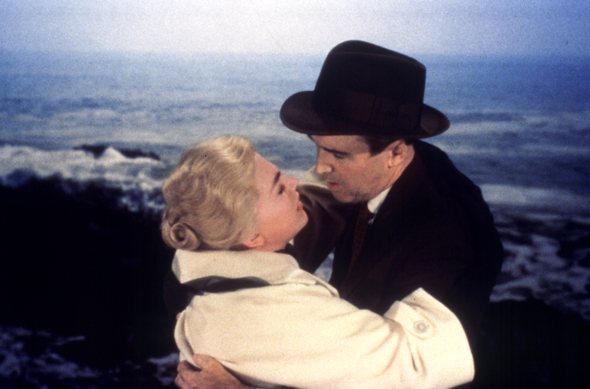
Alfred Hitchcock, 1958 (191 votes)
Hitchcock’s supreme and most mysterious piece (as cinema and as an emblem of the art). Paranoia and obsession have never looked better—Marco Müller
After half a century of monopolising the top spot, Citizen Kane was beginning to look smugly inviolable. Call it Schadenfreude, but let’s rejoice that this now conventional and ritualised symbol of ‘the greatest’ has finally been taken down a peg. The accession of Vertigo is hardly in the nature of a coup d’état. Tying for 11th place in 1972, Hitchcock’s masterpiece steadily inched up the poll over the next three decades, and by 2002 was clearly the heir apparent. Still, even ardent Wellesians should feel gratified at the modest revolution – if only for the proof that film canons (and the versions of history they legitimate) are not completely fossilised.
There may be no larger significance in the bare fact that a couple of films made in California 17 years apart have traded numerical rankings on a whimsically impressionistic list. Yet the human urge to interpret chance phenomena will not be denied, and Vertigo is a crafty, duplicitous machine for spinning meaning…—Peter Matthews’ opening to his new essay on Vertigo in our September issue
2. Citizen Kane

Orson Welles, 1941 (157 votes)
Kane and Vertigo don’t top the chart by divine right. But those two films are just still the best at doing what great cinema ought to do: extending the everyday into the visionary—Nigel Andrews
In the last decade I’ve watched this first feature many times, and each time, it reveals new treasures. Clearly, no single film is the greatest ever made. But if there were one, for me Kane would now be the strongest contender, bar none—Geoff Andrew
All celluloid life is present in Citizen Kane; seeing it for the first or umpteenth time remains a revelation—Trevor Johnston
3. Tokyo Story
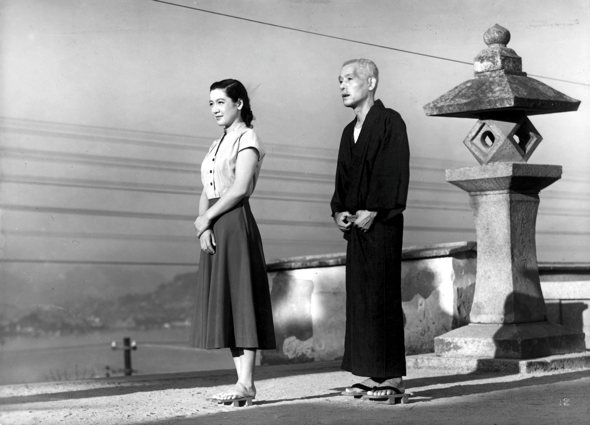
Ozu Yasujiro, 1953 (107 votes)
Ozu used to liken himself to a “tofu-maker”, in reference to the way his films – at least the post-war ones – were all variations on a small number of themes. So why is it Tokyo Story that is acclaimed by most as his masterpiece? DVD releases have made available such prewar films as I Was Born, But…, and yet the Ozu vote has not been split, and Tokyo Story has actually climbed two places since 2002. It may simply be that in Tokyo Story this most Japanese tofu-maker refined his art to the point of perfection, and crafted a truly universal film about family, time and loss—James Bell
4. La Règle du jeu

Jean Renoir, 1939 (100 votes)
Only Renoir has managed to express on film the most elevated notion of naturalism, examining this world from a perspective that is dark, cruel but objective, before going on to achieve the serenity of the work of his old age. With him, one has no qualms about using superlatives: La Règle du jeu is quite simply the greatest French film by the greatest of French directors—Olivier Père
5. Sunrise: A Song of Two Humans

FW Murnau, 1927 (93 votes)
When F.W. Murnau left Germany for America in 1926, did cinema foresee what was coming? Did it sense that change was around the corner – that now was the time to fill up on fantasy, delirium and spectacle before talking actors wrenched the artform closer to reality? Many things make this film more than just a morality tale about temptation and lust, a fable about a young husband so crazy with desire for a city girl that he contemplates drowning his wife, an elemental but sweet story of a husband and wife rediscovering their love for each other. Sunrise was an example – perhaps never again repeated on the same scale – of unfettered imagination and the clout of the studio system working together rather than at cross purposes—Isabel Stevens
6. 2001: A Space Odyssey

Stanley Kubrick, 1968 (90 votes)
2001: A Space Odyssey is a stand-along monument, a great visionary leap, unsurpassed in its vision of man and the universe. It was a statement that came at a time which now looks something like the peak of humanity’s technological optimism—Roger Ebert
7. The Searchers
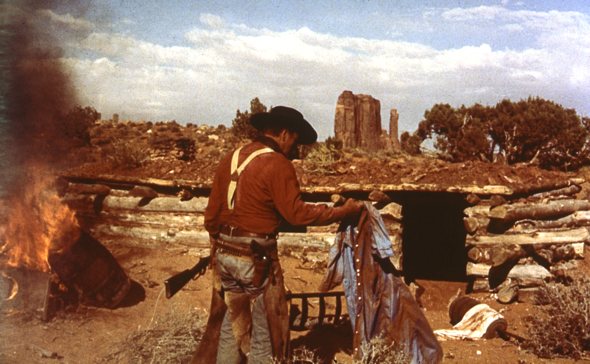
John Ford, 1956 (78 votes)
Do the fluctuations in popularity of John Ford’s intimate revenge epic – no appearance in either critics’ or directors’ top tens in 2002, but fifth in the 1992 critics’ poll – reflect the shifts in popularity of the western? It could be a case of this being a western for people who don’t much care for them, but I suspect it’s more to do with John Ford’s stock having risen higher than ever this past decade and the citing of his influence in the unlikeliest of places in recent cinema—Kieron Corless
8. Man with a Movie Camera
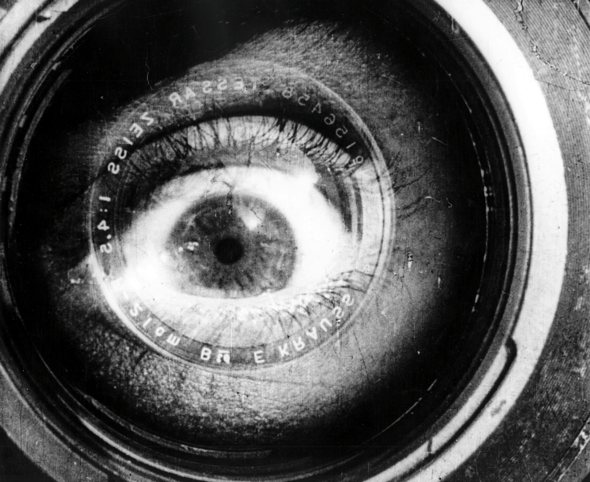
Dziga Vertov, 1929 (68 votes)
Is Dziga Vertov’s cine-city symphony a film whose time has finally come? Ranked only no. 27 in our last critics’ poll, it now displaces Eisenstein’s erstwhile perennial Battleship Potemkin as the Constructivist Soviet silent of choice. Like Eisenstein’s warhorse, it’s an agit-experiment that sees montage as the means to a revolutionary consciousness; but rather than proceeding through fable and illusion, it’s explicitly engaged both with recording the modern urban everyday (which makes it the top documentary in our poll) and with its representation back to its participant-subjects (thus the top meta-movie)—Nick Bradshaw
9. The Passion of Joan of Arc
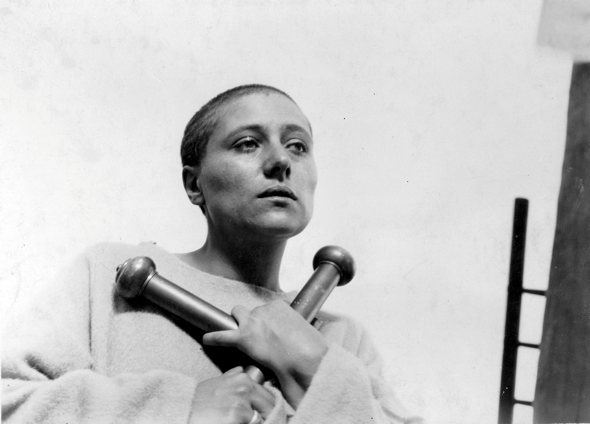
Carl Dreyer, 1927 (65 votes)
Joan was and remains an unassailable giant of early cinema, a transcendental film comprising tears, fire and madness that relies on extreme close-ups of the human face. Over the years it has often been a difficult film to see, but even during its lost years Joan has remained embedded in the critical consciousness, thanks to the strength of its early reception, the striking stills that appeared in film books, its presence in Godard’s Vivre sa vie and recently a series of unforgettable live screenings. In 2010 it was designated the most influential film of all time in the Toronto International Film Festival’s ‘Essential 100’ list, where Jonathan Rosenbaum described it as “the pinnacle of silent cinema – and perhaps of the cinema itself”—Jane Giles
10. 8½
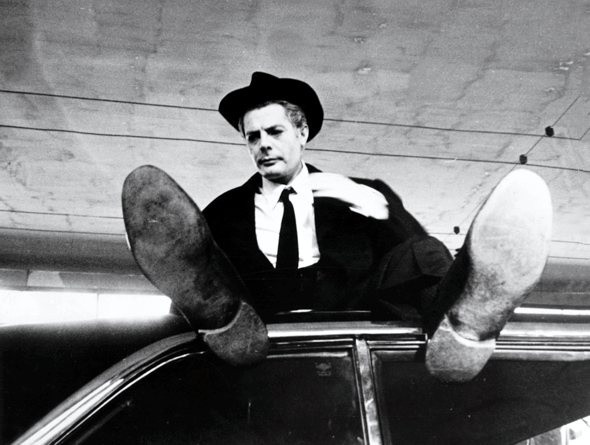
Federico Fellini, 1963 (64 votes)
Arguably the film that most accurately captures the agonies of creativity and the circus that surrounds filmmaking, equal parts narcissistic, self-deprecating, bitter, nostalgic, warm, critical and funny. Dreams, nightmares, reality and memories coexist within the same time-frame; the viewer sees Guido’s world not as it is, but more ‘realistically’ as he experiences it, inserting the film in a lineage that stretches from the Surrealists to David Lynch
—Mar Diestro Dópido
11. Battleship Potemkin
Sergei Eisenstein, 1925 (63 votes)
12. L’Atalante
Jean Vigo, 1934 (58 votes)
13. Breathless
Jean-Luc Godard, 1960 (57 votes)
14. Apocalypse Now
Francis Ford Coppola, 1979 (53 votes)
15. Late Spring
Ozu Yasujiro, 1949 (50 votes)
16. Au hasard Balthazar
Robert Bresson, 1966 (49 votes)
17= Seven Samurai
Kurosawa Akira, 1954 (48 votes)
17= Persona
Ingmar Bergman, 1966 (48 votes)
19. Mirror
Andrei Tarkovsky, 1974 (47 votes)
20. Singin’ in the Rain
Stanley Donen & Gene Kelly, 1951 (46 votes)
21= L’avventura
Michelangelo Antonioni, 1960 (43 votes)
21= Le Mépris
Jean-Luc Godard, 1963 (43 votes)
21= The Godfather
Francis Ford Coppola, 1972 (43 votes)
24= Ordet
Carl Dreyer, 1955 (42 votes)
24= In the Mood for Love
Wong Kar-Wai, 2000 (42 votes)
26= Rashomon
Kurosawa Akira, 1950 (41 votes)
Notas al pie:
* Inobjetable Vertigo. Si no es la mejor, es una de las 3 mejores de todos los tiempos.
**Es difícil de objetar. Aunque tiene razón Roger Koza en que ni siquiera es la mejor película de Orson (yo prefiero Sed de mal o La dama de Shangai), Citizen Kane es un film inagotable, gozoso, genial en cualquier acepción del término.
*** Tokio Story es una película inmensa, pero quizá Ozu esté de moda y Mizoguchi lo supere.
**** Con Sunrise sí: totalmente de acuerdo.
***** Comienza el disparate: 2001 ni siquiera es una de las 1000 mejores películas de todos los tiempos. Ponerla en el Top Five es una ofensa al cine. ¿Cuándo cederá el inexplicable prestigio de Kubrick?
****** Sé que The Searchers goza de un consenso casi irreestricto. No me sumo a él, Prefiero al Ford de The Quiet Man. Pero me voy a quedar solo en esta.
******* Claro que la Juana de Arco está bien, pero me parece que no está tan bien, sobre todo pensando en las que quedaron debajo. Es un resultado de consenso de manual.
******** Sigue el disparate. 8½ está muy lejos de ser lo mejor de Fellini. Y en una lista en la que aún no aparecieron Bresson, Fassbinder o Cassavetes, esta irrupción felinesca se parece un poco al despropósito de 2001.
******** ¿Puesto 16 para Bresson? Creo que al menos hay 12 que no lo merecen. Y ni siquiera elijen al mejor Bresson: el Cura rural, el Condenado a muerte, el Carterista... (Podrían ser 3 de las 5 mejores películas de todos los tiempos).
********** Los 7 samurais, Persona y El espejo: una vez más, ni siquiera son las mejores de sus respectivos autores. Creo que estos votos revelan la inercia y la vagancia de los críticos a la hora de pensar el cine. Persona es una película indigna de Bergman. ¡Y todavía no aparecieron Fassbinder, Visconti y Rosellini!
*********** La aventura es una película influyente y estimable, pero Antonioni sigue estando sobrevalorado.
************ ¿El desprecio? Hmmm... Godard hizo estos últimos años tantas películas superiores a esta. Creo que El desprecio está en este lugar por el culo de Brigitte Bardot.
************* Rashomon, El padrino y Con ánimo de amar: nada que objetar: yo también las podría haber elegido. Pero como en esta lista no aparecieron Fassbinder, Cassavetes, Visconti, Rosellini, el Cura Rural, el Condenado a Muerte, El carterista, Notorious... ¡está todo mal! Hace poco Perrone me decía que Bresson está olvidado y yo le decía que no: tenía razón él.
(Lista completa acá)
9 comentarios:
Sin perjuicio que la lista es bastante más razonable que esas que sólo ponen Spielberg, Lucas y Cameron, coincido y disiento en algunos de tus comentarios.
Citizen Kane es top ten y, en mi humilde opinión, la obra maestra de Welles, básicamente por las grandes innovaciones que aportó al cine (relato en puzzle, la famosa profundidad de campo, etc).
Fellini tiene que estar en un top 25, y 81/2 puede ser una buena elección. No descartaría La Strada o Amarcord.
De Chaplin, prefiero The Gold Rush antes que City Lights.
Obviamente, falta Visconti, imperdonable. Y hay para elegir. Podés meter 5 de las 50.
De Rossellini, no sé. Tengo mis dudas. Creo que su cine no ha envejecido tan bien.
Y de Fassbinder vi poco así que me abstengo de opinar.
Bergman tiene varias top y puede ser que Persona sea superada por otras obras del maestro. A mí me impactaron más El Silencio y Gritos y Susurros.
Con 2001, de acuerdo, sobrevalorada. Es superior Dr.Stranglove.
John Ford no me seduce mucho, así que, en esa no te vas a quedar solo.
Del cine japonés no dejaría fuera de un top 50 la trilogía La Condición Humana de Kobayashi, o, más reciente, algo de Imamura.
Coincido con Le Mepris, no está para un top 50 y sí creo que está L’Avventura como podría estar La Notte. Las ví, por primera vez, muy recientemente y creo que resisten muy bien sus 50 años.
Con Bresson, 100% de acuerdo y faltan sus obras más importantes (Condenado, Pickpocket), aunque Baltasar es una alegoría genial de la pasión (recuerdo un artículo del recordado Leo Sala en Gente de los 60).
Bien por La Regla del Juego de Renoir, pero eso me recuerda que no pusieron nada de Buñuel que tiene varias joyas para elegir.
Creo que Potemkin tendría que estar bastante más arriba de varias (casi inventó el cine, lo que no es poco) y raro que no pusieron nada de Griffith que inventó el montaje (casi nada), aunque El Nacimiento de una Nación sea una oda al KuKluxKlan..
Agregaría La Kermesse Heroica y sacaría Shoah y Taxi Driver (que no me parece la mejor de Scorsese) y me parece que hay demasiado de Dreyer y coincido con que hay otras opciones en lugar de El Espejo, si queremos poner a Tarkovski.
Yo elijo Scarface, de Brian De Palma: es la película que logrará que me asocie a un videoclub y restituya los canales de cine en mi tv.
Estas listas para lo único que sirven es para disentir en casi todo y que trasciendan las películas de consenso. En esa categoría están Citizen Kane, Potemkin, Historia de Tokyo o la pasión de Juana de Arco. Todos reconocemos que son muy importantes aunque quizá nadie las tenga como su película preferida.
En cuanto a Rosellini, creo que él es uno de los artífices secretos del cine actual, muchísimas películas hablan de él sin nombrarlo: desde Hou Hsiao Hsien y Jia Zhang-ke hasta Kiarostami, los Dardenne, Godard, Pasolini... Rosellini es el creador de una poética casi inagotable. En cambio, creo que el que no envejeció bien es Bergman: tiene muy buenas películas, pero al final era una triste imitación de sí mismo y hoy nadie podría continuar por esa senda sin caer en el ridículo.
Vértigo no puede ser, desde mi punto de vista, la mejor, ni ahí. Parece un Rasti. Se ven todos los ladrillitos, fue muy loco lo que me pasó al reverla. Hoy yo pondría a Stalker o Satantango o Berlin Alexanderplatz. Saludos !
Ah, por cierto, la Sight and Sound es inglesa, que caualidad.
La encuesta no es entre ingleses. Votan críticos de todo el mundo y el voto no es secreto. ¿Te parece un rasti? ¿Es muy loco lo que te pasó? A mí tu comment me parece una tortuga con hepatitis.
No sé por qué motivo me tirás con una bolsa de mierda. ¿que te pasa chabón? fumáte uno y tranquilizáte.
Te tiré con una tortuga hepática y vos le tiraste a Hitchcock con una caja de rasti. Bancate una metáfora, no seas llorón.
Y yo estoy re tranqui, fumándome un cañoncito de dulce de leche.
La mejor película de la historia es "Susurros del corazón" del estudio Ghibli de Miyazaki.A joderse.
Publicar un comentario